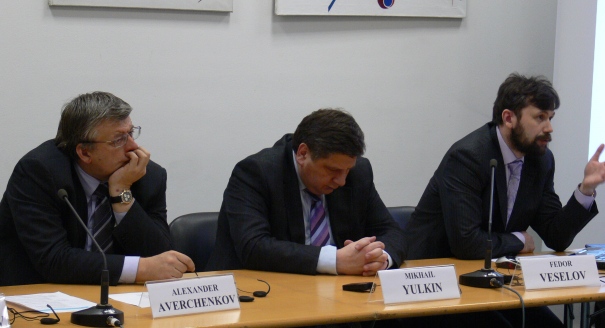Registration
You will receive an email confirming your registration.
IMGXYZ3538IMGZYXRussia has pulled out of quantitative commitments to reduce its greenhouse gas emissions. However, as one of the world’s most energy-intensive economies, Russia has a potentially significant role to play in reducing climate change.
The Carnegie Moscow Center and the Fridtjof Nansen Institute of Norway co-hosted a roundtable discussion of Russia’s economic development in light of the 2011 climate change talks in Durban. Participants included Alexander Averchenkov of the United Nations Development Programme, Fedor Veselov of the Russian Academy of Sciences’ Energy Research Institute, Vladimir Litvak of VTB Capital, Oleg Pluzhnikov of the Russian Ministry of Economic Development, Mikhail Yulkin of the Russian Union of Industrialists and Entrepreneurs, Anna Korppoo of the Fridtjof Nansen Institute, Oleg Shamanov of the Russian Ministry of Foreign Affairs, and Alexei Kokorin of the WWF Russia. Carnegie Moscow Center’s Anna Bessonova and the Heinrich Böll Foundation’s Alisa Nikulina moderated.
Opportunities for Reducing Russia’s Greenhouse Gas Emissions
- Economy Growth: The Russian economy could achieve sustained annual GDP growth even if oil prices fall and it pursues an active climate policy, Veselov asserted.
- Influencing Emissions: Veselov discussed several factors which could influence reducing greenhouse gas emissions in a modern raw materials-based economy in accordance with an innovative type of development, including:
- Energy conservation and continued reduction of energy consumption in the economy.
- Change in the energy resource consumption structure through increased use of hydro and atomic energy. Veselov suggested that renewable energy sources will start to play a much bigger part after 2030-2050 and could account for as much as 10 percent of Russia’s energy balance.
- Affordable cost of renewable energy sources and increased returns on from projects to modernize power stations.
- Energy conservation and continued reduction of energy consumption in the economy.
Russia and Kyoto-2: Medium-Term Economic Development Outlook
Russia’s decision not to accept quantitative commitments under the Kyoto-2 protocol could have consequences for the Russian economy.
- Russian Businesses: Russia should make maximum use of all opportunities to continue climate change negotiations so that Russian businesses can invest in new joint-implementation projects aimed at mobilizing financing for modernizing production facilities and reducing CO2 emissions, Yulkin said. Mechanisms similar to those of the Kyoto Protocol would be useful in carrying out projects to utilize accompanying gas in the oil industry.
- Joint Implementation Projects in the International Context: Pluzhnikov noted that the EU could soon meet its emission reduction commitments. Given that Japan has withdrawn from its commitments and Canada has left the Kyoto Protocol, the international demand for Russian emissions reduction quotes could be very limited. Averchenkov suggested, however, that Russia could create artificial demand for quasi-joint implementation projects by setting up emissions regulation systems covering Russia, Kazakhstan, Belarus, and Ukraine.
Prospects for a Global Climate Change Agreement
The recent climate change conference in Durban could provide an opening for a comprehensive climate change agreement that takes into account the latest global development trends. Shamanov described the Durban conference was a success: the interim climate regulation phase remains in place for some countries, but at the same time, the decision has now been made to begin work on a global agreement.
- Timeframe of the Agreement: The timeframe for concluding a global agreement is until 2020. According to Shamanov, this is the result of a compromise reached with the developing countries, giving them the chance to postpone for a time taking on quantitative emissions reduction commitments.
- A Differentiated Approach: The idea of a differentiated approach to developing countries’ commitments was supported by the developed countries, said Korppoo, although some developing countries were cautious about the proposal. Korppoo argued that a more differentiated scale deserves attention. Dividing countries into developed and developing is not sufficient, she argued. At the same time, it remains unclear how to resolve the existing tensions between developed and developing countries, and whether the activities within a new agreement framework will facilitate the resolving of this confrontation.
- The Calculation Difficulties: Kokorin said that the lack of national assessments measuring economic damage caused by climate change and and a comparable lack of mechanisms for calculating damage into degrees make it hard to calculate by the extent to which countries must cut their emissions levels. The cost of implementing financial mechanisms for emissions reductions, borne by developed countries, would also need to be taken into account, he added.
